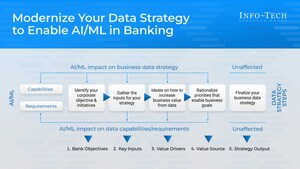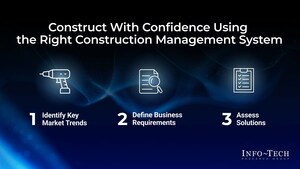
The firm's newly published research explains that by using machine learning techniques, AI can automate many activities surrounding master data management to ease manual processes and improve accuracy.
TORONTO, Sept. 8, 2023 /PRNewswire/ - As organizations delve deeper into the digital era, enterprises are grappling with exponential data growth from various internal and external sources, leading to a labyrinth of fragmented, inconsistent, and sometimes duplicated information shared across systems. Designed to untangle and align crucial data streams, master data management (MDM) can turn data chaos into actionable intelligence, detecting data relationships, resolving duplicates, and ensuring data availability for necessary stakeholders. To support CIOs and IT teams navigating this transformative approach, Info-Tech Research Group has released its latest research, Develop a Master Data Management Practice and Platform. The new resource is positioned to empower organizations to leverage MDM to its fullest potential, setting the standard for the future of data management.
Highlighting the rapidly advancing MDM technological landscape, the firm explains that choices in MDM tools have expanded like never before, with artificial intelligence (AI) at the forefront of MDM innovation. With the integration of machine learning (ML) algorithms, AI is streamlining many MDM processes, including automating data profiling, workflow management, duplicate detection, and intelligent match-merge suggestions, ultimately enhancing precision while reducing manual interventions.
"The most crucial and shared data assets inside the firm must serve as the foundation for the data maturing process," says Ruyi Sun, research specialist at Info-Tech Research Group. "This is commonly linked to master data such as customers, products, employees, and locations. Every organization has master data, but not every organization has a master data problem."
As outlined in the industry resource, MDM plays an invaluable role, especially during mergers or acquisitions. In such scenarios, there's a pressing need for consolidated master data to serve as a single source of truth. Nevertheless, achieving a cohesive perspective on an organization's most crucial data definitions and corresponding record systems can often present some challenges. Organizations often encounter difficulties pinpointing master data discrepancies or fully understanding their data requirements. Conflicting viewpoints and definitions of data assets across business units can pose further complications.
"Master data issues are rooted in an organization's business practices, such as mergers and acquisitions and federated multi-geographic operations," explains Rajesh Parab, research director at Info-Tech Research Group. "To address this issue, organizations will require an MDM solution and the necessary architecture, governance, and support from very senior champions to ensure the long-term success of the MDM initiative. Approaching MDM with a clear blueprint that provides a step-by-step approach will aid in developing an MDM practice and platform."
Info-Tech emphasizes the significance of understanding prevalent business strategies and the underlying master data challenges for the efficient execution of MDM. The firm recommends the following:
Phase 1: Build a Vision for MDM
Assess the Master Data Problem: Build a comprehensive foundation of knowledge surrounding MDM and identify the problems that the organization faces in the areas of mergers and acquisitions, omnichannel strategies, multi-product line management, and multi-ERP setups.
Identify the Master Data Domains: Determine which data domain contains the most critical master data in the organization for an MDM strategy.
Create a Strategic Vision for the MDM Program: To effectively implement MDM, understand its goal of meeting master data users' needs. Develop a plan to secure organizational support and formalize the project by recording key metrics, responsibilities, and MDM goals.
Phase 2: Build the MDM Practice and Platform
Document the Current Data State: Understand the roles of data strategy, governance, and architecture in MDM and document the organization's current data state for MDM.
Document the Target Data State: Consider the various implementation styles for MDM deployments and document target MDM implementation systems.
Develop MDM Practice and Platform: Design a master data management platform and consider the next steps for the MDM project.
Info-Tech explains that an MDM implementation's end goal is to ensure investment in MDM technology delivers the promised business results. By supplementing the technology with rules, guidelines, and standards around enterprise data, organizations will ensure data continues to be synchronized across data sources on an ongoing basis.
To learn more about implementing master data management, download the complete Develop a Master Data Management Practice and Platform blueprint.
For media inquiries on the topic or to get exclusive, timely commentary from Ruyi Sun or Rajesh Parab, experts on master data management, please contact [email protected].
About Info-Tech Research Group
Info-Tech Research Group is one of the world's leading information technology research and advisory firms, proudly serving over 30,000 IT professionals. The company produces unbiased and highly relevant research to help CIOs and IT leaders make strategic, timely, and well-informed decisions. For 25 years, Info-Tech has partnered closely with IT teams to provide them with everything they need, from actionable tools to analyst guidance, ensuring they deliver measurable results for their organizations.
Media professionals can register for unrestricted access to research across IT, HR, and software and over 200 IT and industry analysts through the firm's Media Insiders program. To gain access, contact [email protected].
For more information about Info-Tech Research Group or to access the latest research, visit infotech.com and connect via LinkedIn and X.
SOURCE Info-Tech Research Group








Share this article